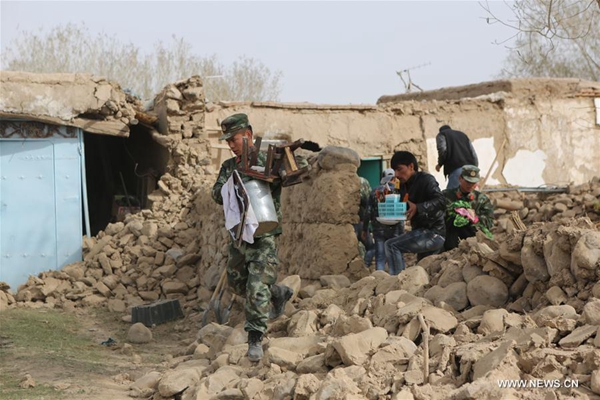1,278 officials held accountable in environmental inspections
A total of 1,278 officials have been held accountable for inadequate environmental protection in the latest round of state inspections, according to a statement released Friday by the Ministry of Environmental Protection.
In late April, seven teams reviewed local government work in the third round of inspections, which took place in areas including Tianjin Municipality and Shanxi and Liaoning provinces.
The teams have looked into a total of 3,324 cases and imposed fines totalling 90 million yuan (about 13.05 million U.S. dollars) in 1,531 of those cases.
Some 481 officials from Liaoning Province were found to have been at fault, the most of the seven municipalities and provinces investigated.
As of May 9, the teams had received a total of 14,479 public complaints, of which the most came from Hunan Province.
The inspected areas have been told to rectify the irregularities found as soon as possible. Their progress has been reported in local media on a daily basis to give the public a response on reported environmental violations.
The central government is fighting pollution and environmental degradation after decades of growth have left the country saddled with problems such as smog and contaminated soil.
The teams are currently inspecting prefecture-level cities to verify key issues that emerged from provincial level inspections.
Reinforcing the country’s sky net
In the radar force of the PLA (People’s Liberation Army) Air Force, some vehicles are mobile – as opposed to fixed stations on mountain tops – and they are called mobile radar forces.
The air force of the PLA Southern Theater Command, has such a mobile radar battalion. Its commander Major Guo Tao said on April 25 that they are “a necessary complement to fixed stations” in that they “patch up, reinforce and extend the colossal sky net” of the country’s radar detection ranges.
Established in May, 1991, this battalion was the first-ever modern mobile radar force in the PLA Air Force. Its creation followed the central military authority’s call for an effective response to high-intensity regional conflicts in modern warfare.
In modern warfare, combatting parties usually seek to paralyze each other’s air defenses first before conducting further operations. Radar installations, which are the eyes of the air force, are among the first and most vulnerable targets for enemy attacks.
Having no self-defense capabilities itself, once a radar is destroyed, it can tear apart the regional defensive monitoring network. Under such circumstances, the mobile radar forces must kick in and patch up the country’s defensive sky net of radar monitoring.
Likewise, there may be blind spots in radar detection ranges either affected by terrain or a radar’s own limitations, or a new battlefield out of the range of fixed radar stations. As for the solution, deploying a mobile radar unit in such blind-spots will instantly reinforce the PLA’s air defenses.
Throughout the 26 years since the battalion’s establishment, this mobile radar force has participated in more than 30 major exercises, and their tracks have reached 26 provinces nationwide.
“We stand ready to b deployed anywhere that the country needs,” said Senior Colonel Duan Zhibing, bridge political commissar, which supervises the battalion. He explained that the mobile radar force is also an extension of the country’s sky net.
China launches emergency response to Xinjiang quake
|
|
|
Rescuers work at Kuzigun Village in Taxkorgan County, northwest China’s Xinjiang Uygur Autonomous Region, May 11, 2017. [Photo/Xinhua] |
China has activated emergency response procedures following a 5.5-magnitude earthquake in Xinjiang Uygur Autonomous Region early Thursday morning.
The China Earthquake Administration activated level-III emergency response procedures earlier Thursday.
All departments concerned are on high alert, and will continue to monitor for aftershocks and evaluate damage.
The Ministry of Civil Affairs and the China National Commission for Disaster Reduction have also initiated grade-IV emergency response measures and sent teams to assist relief work.
A grade-IV response, the lowest in China’s emergency response system, means a 24-hour alert, daily damage reports, and the allocation of money and relief materials within 48 hours.
Also on Thursday, China’s Red Cross Society activated level-III emergency response to the earthquake. Apart from sending a work team to assist relief, it has allocated emergency funds of 100,000 yuan (US$15,000) and sent supplies from its local branch to the affected region.
Eight fatalities have been confirmed and 23 people have been injured in the quake that jolted Taxkorgan County, Xinjiang, at 5:58 a.m. Thursday. Over 1,500 houses collapsed or were badly damaged.
Taxkorgan, some 1,250 kilometers from Urumqi, capital of the region, borders Pakistan, Afghanistan and Tajikistan.
1 ex-official sentenced, 1 pleads guilty in corruption cases
Wang Baoan, former head of the National Bureau of Statistics, pleaded guilty on Thursday to accepting 154 million yuan (US$22.3 million) in the Zhangjiakou Intermediate People’s Court, Hebei Province.
A verdict will be issued at a later date.
In a separate case on the same day, in Lanzhou, Gansu Province, Mao Xiaobing, a former high-ranking official from Qinghai Province, was sentenced to life in prison for taking bribes and embezzling public funds.
The Lanzhou Intermediate People’s Court found that Mao, a former member of the Standing Committee of the Communist Party of China Qinghai Provincial Committee, had accepted more than 104 million yuan in bribes and embezzled 400 million yuan in public funds.
In the Hebei case, prosecutors said Wang, the former NBS head, abused power to gain benefits for others on project approvals, business contracts and job promotions, then accepted bribes, which were either paid in cash or property, of 154 million yuan, either to himself or through family members, between 1994 and 2016.
Over the course of 22 years, Wang served as the Party chief of the General Office of the State Administration of Taxation, vice-minister of finance and head of the NBS, among other roles.
In January 2016, the country’s top anti-graft watchdog, the Central Commission for Discipline Inspection, opened an investigation of Wang for “serious violations.” It said he seriously violated Party political discipline and made speeches that went against the CPC Central Committee position on important matters.
The watchdog said he obstructed the investigation and disobeyed the eight-point code to cut bureaucracy, while living a corrupt life that included stays at high-end hotels and visits to expensive entertainment venues.
He was expelled from the Party and removed his post in August.
In the other case on Thursday, the court in Gansu Province deprived Mao Xiaobing, the former Qinghai official, of his political rights and ordered his personal property confiscated. Illicit gains will be turned over to the State treasury.
The verdict said that between 1995 and 2013, Mao took advantage of various official positions to seek benefits in project contracts, stock acquisitions, purchasing and sales of products and real estate developments on behalf of others.
In exchange, he extorted or accepted money or gifts from companies and individuals.
The court also found that in 2006, Mao had taken advantage of his post and embezzled public funds.
It said that in deciding the sentence, it took into consideration the fact that Mao had extorted bribes, which deserves harsher punishment. But it also noted that he had confessed, shown remorse, cooperated in returning illegal gains and provided information about other people’s violations during the investigation, facts that may warrant leniency.
Mao said he will not appeal.

 0
0 








No comments.